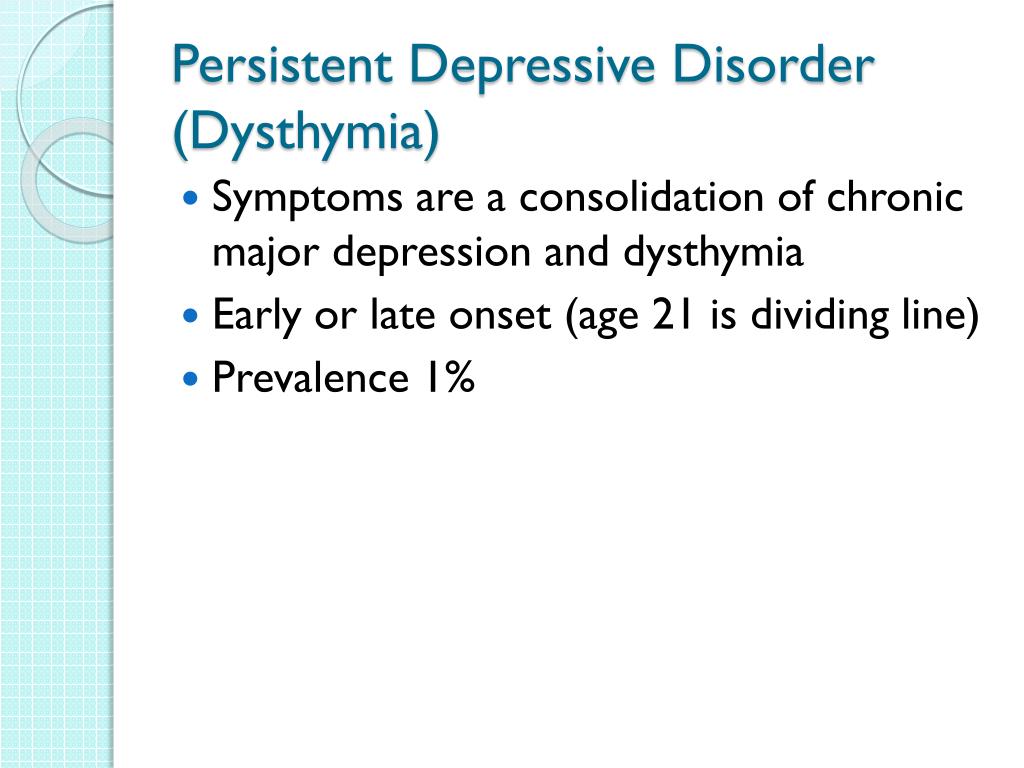

- #Persistent depressive disorder dsm 5 pdf
- #Persistent depressive disorder dsm 5 license
- #Persistent depressive disorder dsm 5 download
- #Persistent depressive disorder dsm 5 free

If you have any of the above, including a traumatic event, a family member with it, and so on, you may be at risk for PDD. PDD can begin early on, from childhood to young adult. If you have had a difficult or traumatic life experience happen to you recently, there may be a link between this experience and PDD symptoms. Untreated trauma or PTSD may result in the development of depression. Genetics: It's unknown what genes can cause depression, but there does seem to be a link between you having depression and one of your family members having one. When neurotransmitters change, it can cause depression. The cause of this is unknown.īrain chemistry: Depression is often called a chemical imbalance in the brain, and this is what they're talking about. Instead, it can involve different causes and a combination of them, such as:īiological difference: You may have had your brain change physically. With many of these mental disorders, there is no one cause. So as you can see, the name is mostly self-explanatory.
#Persistent depressive disorder dsm 5 free
Being free of any PDD symptoms won't last you more than two months. For children and teenagers, it can be diagnosed in one year. This feeling has to occur for at least two years. There may be some days where you aren't as depressed, but you may feel depressed more days than you don't. PDD deals with depression that happens throughout most of your day. You may lose interest in activities even though they're fun. You may be sad even though your life is going great. Depression is more than just feeling sad it's a tenacious feeling of sadness and apathy.

There didn't appear to be any big differences between the two conditions, and so the name stuck.Īs you probably guessed, it has to do with depression. Dysthymia comes from an Ancient Greek term that translates to "bad state of mind." The reason why it became known as PDD is because dysthymia was combined with chronic major depressive disorder. Before 2013, when the DSM-5 was released, it was called dysthymia. Persistent Depressive Disorder Or Dysthymia?īefore we talk about PDD, you may have heard of it be called dysthymia.
#Persistent depressive disorder dsm 5 download
You can download Adobe Acrobat Reader DC here.In this post, we'll be talking about the persistent depressive disorder or PDD.
#Persistent depressive disorder dsm 5 pdf
You will need a PDF reader to view the interview. Any additional downloads will require additional purchase. You will be allowed to download this interview twice.
#Persistent depressive disorder dsm 5 license
Please note: purchasing a download of the Persistent Depressive Disorder (PDD) (Dysthymia) Module for the MINI is not a license agreement for use. Please note: an earlier product versions included this module with the Major Depressive Disorder Subtypes. These internal hyperlinks and bookmarks are only available when viewing the product in Adobe Acrobat Reader or Adobe Acrobat Pro, but not when viewing the product in page preview. It contains bookmarks and has a search / find function. This PDF contains the Adult and Child / Adolescent modules for PDD and its subtypes.įor ease of navigation, this document has many internal hyperlinks between the graphics and the related text and between the text and related text. This product is the Persistent Depressive Disorder (PDD) (Dysthymia) Module for the MINI 7.0.2 for DSM-5. It has been updated to map to both DSM-IV, MINI 6.0 (version 10/10/10), and DSM-5, MINI 7.0.2, diagnostic criteria. The MINI has been translated and linguistically validated in over 70 languages. The MINI is the most widely used psychiatric structured diagnostic interview instrument in the world, employed by mental health professionals and health organizations in more than 100 countries. With an administration time of approximately 15 minutes, the MINI is the structured psychiatric interview of choice for psychiatric evaluation and outcome tracking in clinical psychopharmacology trials and epidemiological studies. The Mini International Neuropsychiatric Interview (MINI) is a short, structured diagnostic interview developed initially in 1990 by psychiatrists and clinicians in the United States and Europe for DSM-III-R and ICD-10 psychiatric disorders.


 0 kommentar(er)
0 kommentar(er)
